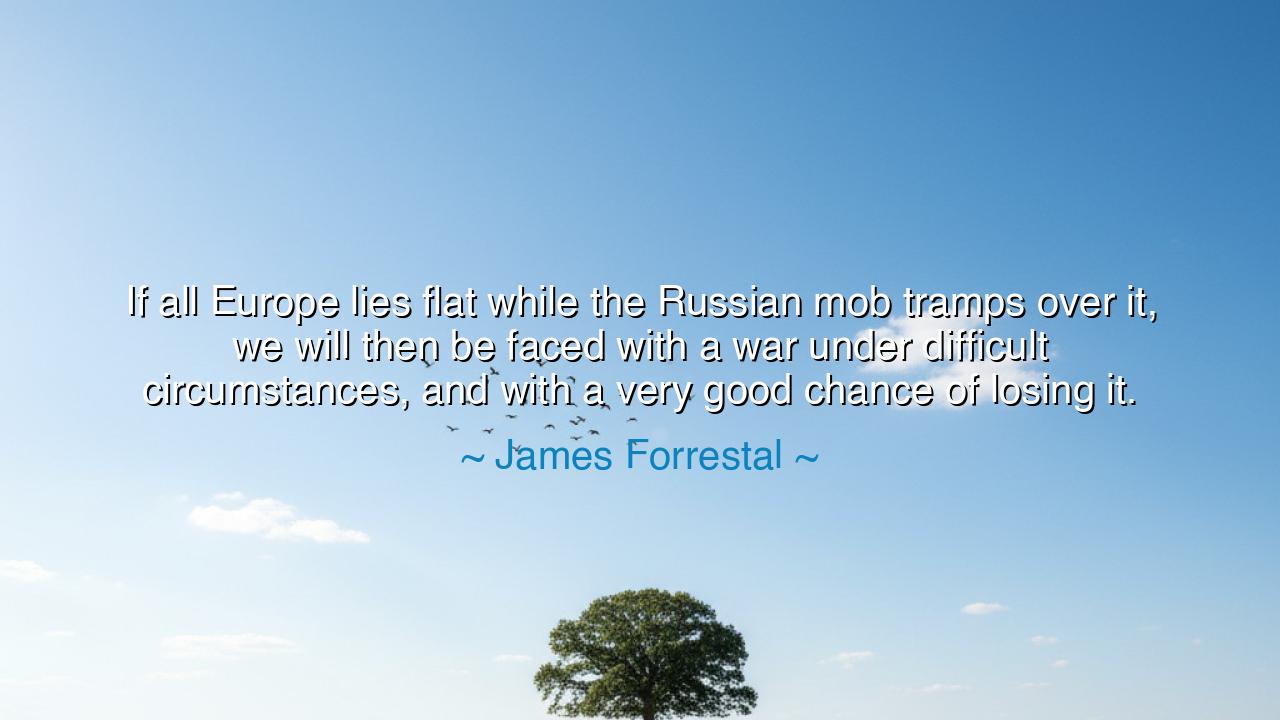
If all Europe lies flat while the Russian mob tramps over it, we
If all Europe lies flat while the Russian mob tramps over it, we will then be faced with a war under difficult circumstances, and with a very good chance of losing it.






"If all Europe lies flat while the Russian mob tramps over it, we will then be faced with a war under difficult circumstances, and with a very good chance of losing it." These words, spoken by James Forrestal, the first U.S. Secretary of Defense, serve as a sobering warning to the world. In this prophetic statement, Forrestal speaks of the dangers of inaction in the face of aggression, and the perils of allowing one's enemies to advance unchecked. The imagery of a flat Europe, overrun by a relentless force, evokes the very real threat of an impending war, one that, if allowed to escalate, could have devastating consequences. It is a call to arms, a plea for vigilance, and a reminder that standing by in passivity in times of rising tension is a path that leads to catastrophe.
In the ancient world, the notion of defending one’s territory was a matter of life and death. The Romans, for example, understood the importance of maintaining the integrity of their borders. The Barbarians who threatened their empire were not just external enemies, but symbols of chaos, of forces that could unravel the stability of society itself. When Rome became complacent, when it allowed its enemies to grow unchecked, it suffered the consequences. The fall of Rome was not simply a result of external invasion, but a product of internal decay and negligence—a failure to act in the face of rising threats. Forrestal’s warning serves as a modern reflection of this timeless truth: to allow one's enemies to advance without resistance is to invite defeat.
Consider the example of Napoleon Bonaparte, whose relentless ambition and expansionism swept across Europe in the early 19th century. At the height of his power, Napoleon’s forces were unstoppable, yet the nations of Europe failed to unite in time to stop him. The Battle of Leipzig, known as the Battle of Nations, was a turning point where a coalition of European powers finally brought Napoleon to a standstill. Had Europe remained fragmented or passive, Napoleon’s forces would have continued their relentless march. The lesson of this historical moment is clear: unity, vigilance, and action are necessary to preserve peace and security. It is only when nations come together in defense of what is right that they can hope to withstand the pressures of an aggressive force.
Forrestal’s statement also reflects the historical reality of the Cold War, a time when the world stood at the precipice of nuclear annihilation. The threat of Soviet expansion was real, and the possibility of a global conflict loomed large. The United States and its allies, having already witnessed the devastation of World War II, knew that the stakes were higher than ever. The rise of the Soviet Union and the spread of communism were seen as direct threats to the democratic values of the West. Just as Europe faced the challenge of resisting Napoleon’s conquest, so too did it face the Russian threat during the Cold War. Forrestal understood that hesitation, or a failure to act decisively, would lead to disastrous consequences, and that the world’s ability to confront aggression was the key to avoiding war.
In our own lives, Forrestal’s words offer a lesson in the importance of action and awareness. Just as nations must remain vigilant against external threats, so too must we stay alert to the dangers and challenges that arise in our personal and collective lives. Complacency and passivity are the enemies of progress. Whether in our careers, relationships, or communities, inaction in the face of problems only leads to their growth and eventual domination. There is wisdom in the proactive approach—in recognizing the warning signs of potential conflict or failure and acting decisively to address them. It is only through vigilance and courage that we can avoid the traps of neglect and inaction.
Forrestal’s warning is also a call to unity. Just as Europe had to come together to face the shared threat of Napoleon and later the Soviet Union, so too must we unite in the face of common challenges. The greatest threats—whether they be external forces or internal divisions—are often best met when we stand together, when we recognize that our collective strength far outweighs any individual or fragmented efforts. In the modern world, where the threats to our peace and security may come in many forms, whether political, social, or environmental, the need for unity, cooperation, and shared purpose has never been more critical.
In conclusion, James Forrestal’s words ring through the ages as a timeless reminder: to allow complacency to settle in the face of rising threats is to court defeat. Whether on the stage of international conflict or in the daily struggles of our personal lives, we must act with courage, awareness, and resolve. Let us not wait for the crisis to overwhelm us, but let us prepare ourselves and our communities to stand firm in the face of adversity. It is only through action, unity, and vigilance that we can hope to preserve the values and the peace we hold dear. Let Forrestal’s wisdom guide us: never falter in the face of rising danger—for it is only by confronting it head-on that we can hope to secure a future of strength and peace.






AAdministratorAdministrator
Welcome, honored guests. Please leave a comment, we will respond soon